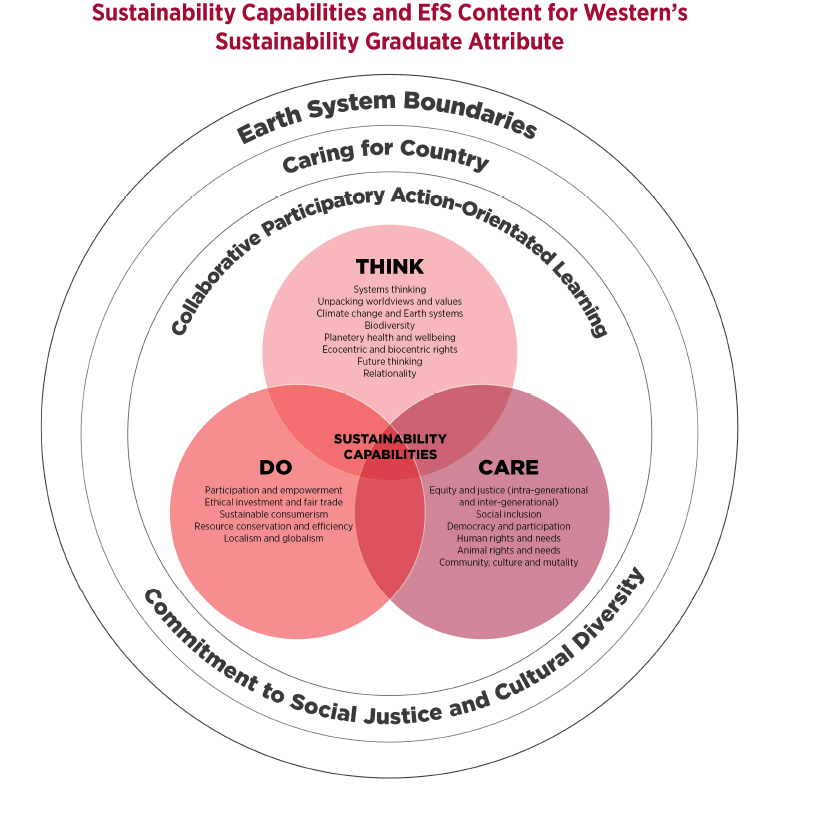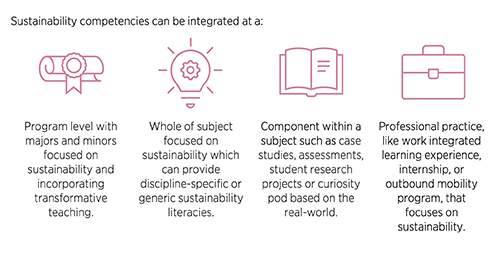Sustainability Study Opportunities at Western
Education for Sustainability (EfS) puts emphasis on the necessary interrelationships between theory and practice; local and global scales and present and future and thus has a global citizenship component that requires a critical evaluation of environment and social justice issues. At Western students from varying discplines and levels can undertake a degree specialisations that support transformative teaching for the SDGs. This is to (Target 4.7) "... ensure that all learners acquire the knowledge and skills needed to promote sustainable development, including, among others, through education for sustainable development..." . Our specialisations include:
Think, Care, Do: Fostering sustainability capable students

Our approach through EfS and in response to our ‘Sustainability’ Graduate Attribute is to incorporate sustainability competencies that focus on what a graduate can do as much as what they learn, and to develop students and graduates who can critically envision better futures and take action towards it. We have themed these sustainability competencies competencies as Think (cognitive), Care (socio-emotional) and Do (praxis). Sustainability comptencies can be incorporated into the your curriculum at different levels, for example the Communicating for Sustainability (opens in a new window) subject, open to all undergraduates, challenges students to become sustainability champions through project-based learning and colloboration with local partners. Watch the video trailer (opens in a new window).

Find out more about how to incorporate sustainability competencies into your teaching (PDF, 245.99 KB) (opens in a new window). Contact the Sustainability Education team to discuss further or to nominate a program you are studying or teaching.
EfS Principles for our Teaching
Based on Bawden (2005) and Sterling (2012) work, EfS learning concepts are understood on the basis that sustainability is not a state nor an end point but a practice and an ethic. There are a number of guiding principles that can be utilised when looking at how sustainability competencies could be incorporated into your teaching:
- Different frameworks for knowing: Being able to learn and question prevailing epistemic (worldview) beliefs and value assumptions:
- Interdependence: of society, economy, and the natural environment, from local to global scales;
- Citizenship and stewardship: rights and responsibilities, participation and co-operation;
- Needs and rights of future generations;
- Diversity: the importance of cultural, social, economic and biological variety;
- Quality of life, equity and justice;
- Sustainability and change: development and carrying capacity; and
- Uncertainty and precaution in action.
- Whole person learning: cognitive, socio-emotional, affective
Do you teach or study a specialisation that you think meets these EfS principles? Nominate it!
What do we mean by 'sustainability'?
Sustainability is a contested term with a long and complicated trajectory. United Nations Brundtland Commission defined sustainability as ‘meeting the needs of the present without compromising the ability of future generations to meet their own needs’. Sustainable development is seen as ‘not a fixed state of harmony, but rather a process of change in which the exploitation of resources, the direction of investments, the orientation of technological development, and institutional change are made consistent with future as well as present needs.’ (Brutland, 1987: Clause 3.30). The 2030 Agenda for Sustainable Development, adopted by all 194 United Nations Member States in 2015, identifies 17 Sustainable Development Goals (SDGs), which are an urgent call for action by all countries in a global partnership. At Western we acknowledge that sustainability definitions are diverse and contestable.

